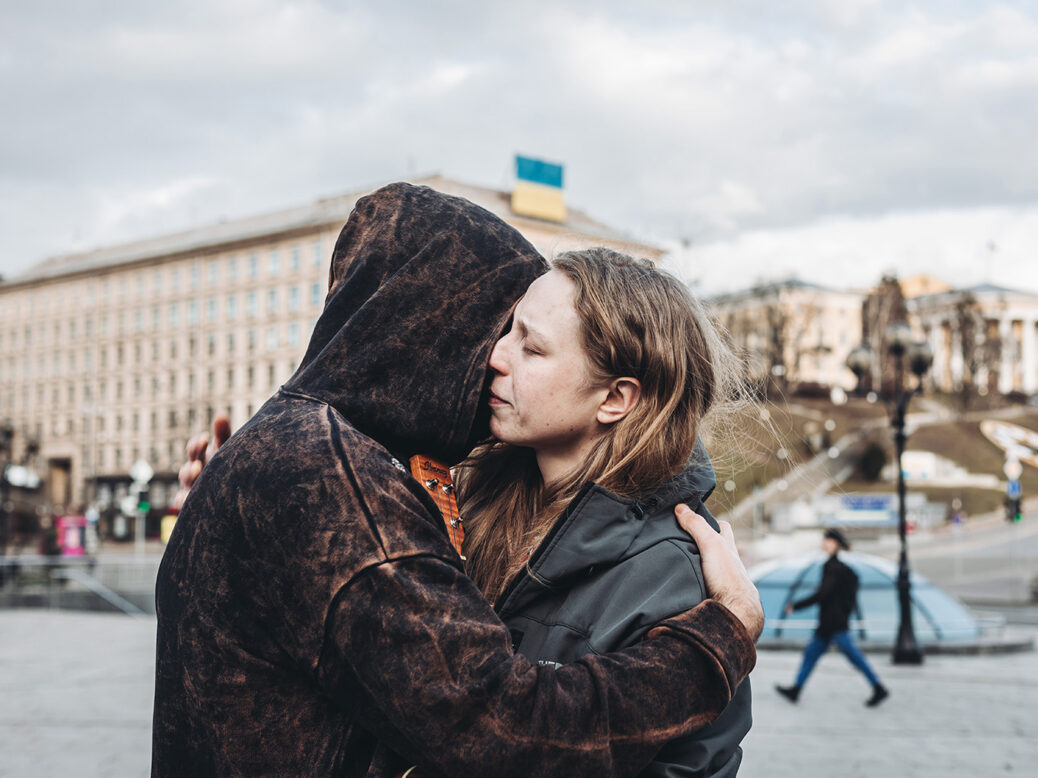
The frail hobble with canes, faces etched with fear. Little girls in pompom hats clutch dolls in mothers’ arms. Ukrainian soldiers in green camouflage carry pink prams. A limp hand protrudes from a dirty sheet covering a family of four splayed, dead, on the ground. Only their grey suitcase is left, standing guard on a darkening winter’s day. This image was splashed across front pages worldwide. This is Irpin, 12 miles west of Kyiv. It used to be a charming railway station town. Now, it’s under incessant Russian shelling as residents try to flee, leaving homes in flames. Ukrainian forces are firing back, trying to keep the Russians at bay. Little Irpin, life blasted from its streets, will now live in infamy.
***
Kyiv holds its breath – all of us do. A centuries-old city is being kitted out for war. Every time we go out into the streets, they look different: more checkpoints, more soldiers. The beating heart of the capital – Maidan Independence Square – has been emptied of people. The iconic “I Love Ukraine” sign is surrounded by sandbags. Cobbled streets are strewn with “hedgehog” anti-tank beams and spiked barriers to stop the lumbering advance of the enemy’s armoured convoy; it still sits, 40 miles long, on the edge of Kyiv, beset by logistical woes, bombarded by Ukrainian ambushes. Is it really coming to Kyiv? The nervous guessing games never end in President Putin’s war. Is there too much resistance, too much sacred history here – for Russians and Ukrainians – for Putin to pound this splendid city into submission? Would he dare do it?
I hear journalists and generals in faraway capitals repeatedly asking “why doesn’t Ukraine give up now because, sooner or later, mighty Moscow’s military will prevail?” Of course it would be more sensible, more humane, to stop this torment being inflicted on the people of Mariupol, Kharkiv, Volnovakha, Chernihiv. Places many people had never heard of before are being wiped off the map. Hundreds of thousands are fleeing west, crossing borders, to escape this hellfire. But many stay and many fight. The images are jaw-dropping. Civilians walk straight into the line of Russian fire. Residents of Russian-occupied Kherson fill the streets, not with white flags of surrender, but Ukraine’s blue and yellow standard. A woman brought down a drone with a bottle of pickled tomatoes hurled from her balcony. Pickles! But symbolism, however strong, doesn’t translate into survival – not always.
***
“I wouldn’t like the Ukraine story to be that of 300 Spartans,” insists Ukraine’s leader Volodymyr Zelensky. Of course, history tells us that Sparta’s heroic last stand against an estimated million Persian soldiers in 480 BC wasn’t the full story; the Spartans had formed an alliance with other Greek states. Ukraine’s heroic defence is also being strengthened by Western weapons. But repeated appeals for a no-fly zone are met with a thunderous “no”; the West won’t be drawn into direct conflict with Russia. “Nato Close the Sky” flashes on billboards across Kyiv, a cry in the dark.
***
Sometimes there’s a sickening flash of recognition. It happened on 4 March when I watched footage from a drone camera sweep across the smouldering streets of Borodyanka, all too close to Kyiv. Soaring façades of high-rise blocks were ripped away, leaving charred walls where families had once hung their washing or watered plants. Aleppo. The same ravages I and others saw close-up in 2016 during the ferocious Russian and Syrian bombardment of the rebel-held east of the ancient city. Sergei Orlov, the deputy mayor of the southern port city of Mariupol, made the same observation: “if you look at the photos of Aleppo, this is Mariupol today.” The invasion of Ukraine, now in its second week, seems to be playing out, in part, as a repeat of Syria’s war on terrifying fast-forward.
***
I wrote about Liana last week, my neighbour on the next mattress in our basement bunker. Her cheery resolve has been crumbling by the day as she anguishes over the plight of her father in his home, to the north, close to the Russian-Belarusian border. He watched as Russian forces moved in, dug in, some rumbling past towards Kyiv. Then one day, young Russian soldiers barged into his home, asking for cigarettes. They never left. And the fighting in his village never stopped. Confined to his basement, Liana’s father finally came up for air. “He could only see the sky,” Liana told me this week, sobbing uncontrollably. His house was gone, flattened in the fighting. The life of a retired man in his 60s, shattered. It’s a story being told across Ukraine, over and over.
***
History sits waiting. Sparta. Syria. The Second World War. Liana tries to take refuge in the past by reading a Russian translation of Homer’s Iliad. She has a beautifully worn book, one of 50 copies owned by Catherine the Great. The last Russian empress is remembered in many ways, including the founding of the regal port city of Odessa in 1794. Odessa, the “pearl of the Black Sea”, evokes a history woven in red and gold – bloodshed and bravery, Pushkin and Potemkin Stairs. Now its magnificent opera and ballet theatre is sandbagged. Will even Odessa not be spared?
Lyse Doucet is the BBC’s chief international correspondent.
This article appears in the 09 Mar 2022 issue of the New Statesman, Putin's War of Terror





